The pressure is felt by the host nation, where the rate of infection has steadily risen. Though the numbers are not alarming yet, the nervousness among the Japanese government is palpable amid rising opposition to inviting thousands from across the world in the middle of a raging pandemic.
That nervousness was reflected last Sunday in a tweet from the economic adviser to Prime Minister Yoshihide Suga, which faced flak for understating the threat Covid-19 posed to the country.
“Japan is a mere ripple”, read Yoichi Takahashi’s tweet, which was accompanied by a graph. It compared the Covid-positive cases in Japan to other countries. “So the Olympics should be cancelled for this? lol lol,” he added.
It led to an uproar, calling for Takahashi’s resignation.
The chairman of the Japanese Communist Party, Kazuo Shii, slammed the comment as “lacking the ability to imagine or feel the pain of all the people who have suffered and lost their lives,” as quoted by Japanese daily, ‘The Mainichi’.
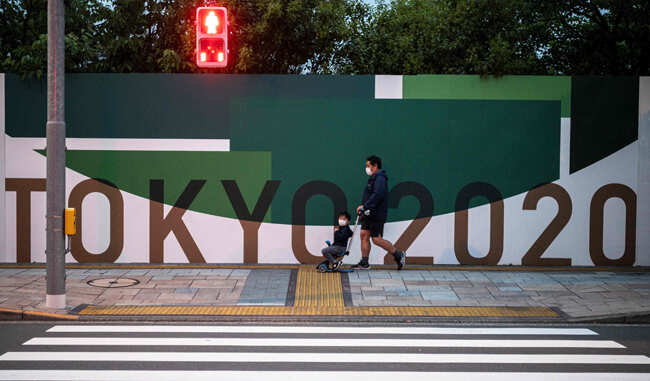
(Originally scheduled for 2020, the Olympics were postponed last year to 2021 because of the pandemic – AFP Photo)
CANCELLATIONS AND POSTPONEMENTS
Takahashi’s tweet seemed to have been blind to certain developments pointing towards the organising committee and the International Olympic Committee’s (IOC) apprehensions.
One of the most telling signs was IOC president Thomas Bach‘s Japan visit this month being cancelled after the state of emergency in Tokyo and three other areas was extended last week to until May 31.
“By monitoring the coronavirus infection situation and other developments, we will coordinate so he [Bach] can visit at as early a date as possible,” the organising committee was quoted by ‘The Mainichi’.
Bach was scheduled to travel next Monday to Hiroshima and meet the torch relay, and then probably be in Tokyo.
In another hiccup for the Olympic torch relay reported by the Japanese news agency Kyodo, the stretch involving the western Japan prefecture of Okayama is unlikely to involve use of public roads for the relay on May 19 and 20.
Last Friday, the local government in Fukuoka prefecture cancelled the relay, becoming the first prefecture to do so since the start of the relay in March. In Osaka last month, the torchbearers could run only in an empty park.
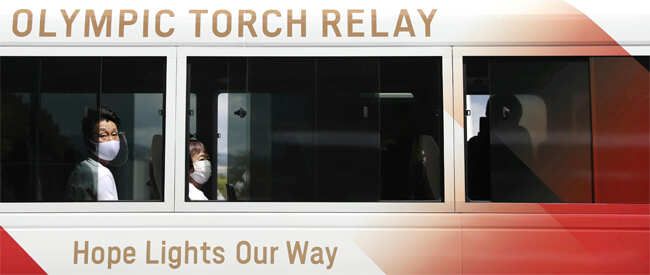
(The torch relay has faced various hiccups, including staffers testing positive for Covid-19 – Reuters Photo)
An editorial in ‘The Mainichi’ summed up the Covid situation in Japan in the context of the Olympics.
The piece read: “The Tokyo 2020 Olympic and Paralympic Games are approaching quickly, but if the government is hesitating to take drastic measures because of the Games, it’s placing the cart before the horse. Keeping down infections is an absolute prerequisite for the Games to go ahead.”
The government was left with no choice but to extend the state of emergency in Tokyo and other hotbeds of Covid-19.
An economic forecast reported locally that the estimated loss from the extended state of emergency will be around $9.2 billion. But controlling the virus is Japan’s top priority at the moment.
PREPARATIONS CONTINUE, AMID CHALLENGES
Preparations are on course for the Olympics, which reportedly has $15.4 billion riding on it, besides the television broadcast income that the IOC is expected to earn.
An Asian Olympic qualification event for rowing and an athletics test event at the main Olympic stadium were conducted successfully last week.
“With God’s grace, all went well,” said India’s rower Arjun Lal Jat , talking to Timesofindia.com. He, along with his partner Arvind Singh, booked an Olympic spot in the men’s double sculls event.
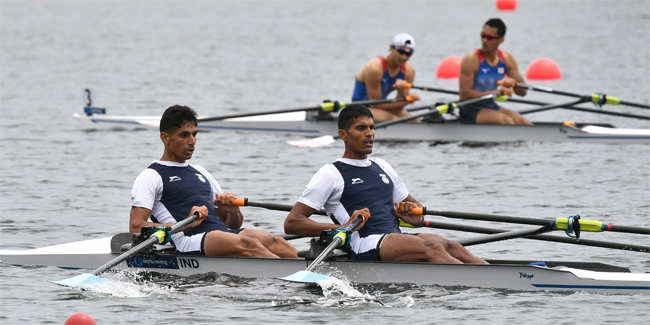
(India’s Arjun Lal Jat & Arvind Singh competing at the Asian Olympic rowing qualifier at Tokyo Bay – AFP Photo)
But the rowers admitted that it was far from what they normally see and experience at an international event.
“We gave our 100% despite restrictions due to the emergency [in Tokyo]. It never felt like an Olympic qualifier because there was no buzz,” said Arvind Singh when contacted by Timesofindia.com.
The duo added that travel to Japan for the competition remained uncertain until the last moment, which had made them anxious. The coach, Ismail Baig, would keep reminding them about Covid-appropriate behaviour and how a mistake can lead to their suspension.
“It took us around five hours to clear immigration at the airport after landing in Japan. There were multiple check points because of [Covid] testing and other safety measures. It was tough,” said Arvind.
“On a daily basis, we had to mail the authorities [via mobile apps] and tell them we are okay or if we had developed any symptoms. Between 10 am to 2 pm daily, we had to send that update on mail. They could also track our location through the app.”
‘FELT BEYOND SAFE’
Compared to the rowing event, the one-day athletics meet saw just nine international athletes among the 420 who competed overall, besides World Athletics chief Sebastian Coe flying in to gauge preparedness.
But scenes outside the stadium were a stark contrast from what was happening inside. A group of around a hundred people had gathered to protest against the Olympics, carrying banners that read “Olympics Kill The Poor” and “Olympics — Just Stop It,” as reported by the Associated Press. This was after an online petition for cancellation of the Olympics managed to collect 300,000 signatures in just three days.
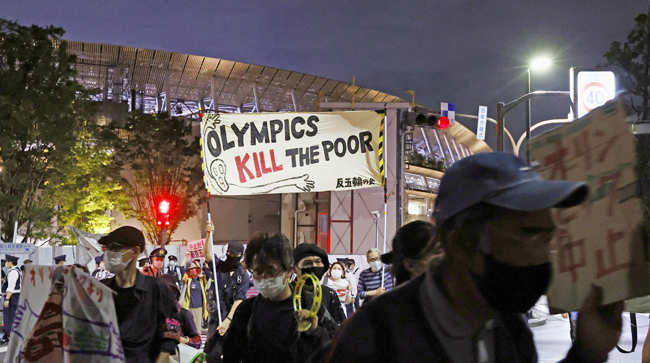
(Protesters outside the main Olympic stadium where an athletics test event was held on May 9 – Reuters Photo)
Inside the stadium, the track-and-field disciplines went on smoothly, and among the nine foreigners participating in the event was US sprinter Justin Gatlin.
“I felt beyond safe,” Gatlin was quoted as saying by the Associated Press. “I’ve been tested every day.”
Gatlin won the 100m final with a timing of 10.24 seconds.
The American said that several added layers of safety measures are unavoidable even if they make athletes a little uneasy.
“I know a lot of athletes are not going to be happy with this, but these are the measures to keep us safe. I think it’s worth it,” said Gatlin.
Coe agreed with Gatlin.
“Is it perfect? No. But the vast majority of athletes I speak to are just wanting to get into the Games, understanding that it will not be the type of Games they have experienced before,” said the World Athletics chief.
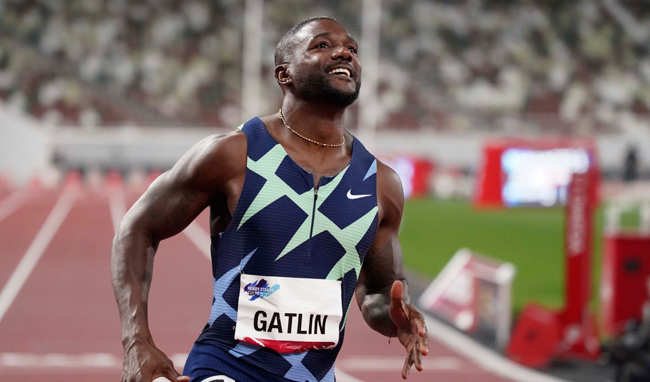
(Justin Gatlin won the 100m race at the athletics test event in Tokyo – PTI Photo)
TOP JAPANESE ATHLETES CONCERNED ABOUT PUBLIC REACTION
But Japan’s world No. 2 women’s tennis player, Naomi Osaka, doesn’t have a definitive answer if the Games in her country should go ahead.
“To be honest, I’m not really sure,” Osaka told the BBC at the Rome WTA tournament. “I’m an athlete and, of course, my immediate thought is that I want to play in the Olympics. But as a human, I would say we’re in a pandemic; and if people aren’t healthy and if they’re not feeling safe, then it’s definitely a really big cause for concern.”
Osaka’s compatriot Kei Nishikori was also in Rome and expressed his concerns about the bio-bubble inside the Games Village.
“It’s 10,000 people in a Village, playing a tournament. I don’t think it’s easy, especially [with] what’s happening right now in Japan, it’s not doing good,” Nishikori said at a press conference in Rome.
“You can make a good bubble and maybe you can do it. [But] There is some risk too. What happens if there’s 100 cases in the Village? Or it can be thousands.”
However, Monday in Tokyo was slightly better in terms of the Covid case-load. A total of 573 infections were reported on May 10, which is just over half of the numbers for May 9 (1032). But ‘The Mainichi’ also reported that cases usually go down on Mondays as the number of tests conducted over the weekends, especially Sundays, is low.

(Tennis ace Naomi Osaka is one of the top contenders for women’s singles gold at the Tokyo Olympics – AP Photo)
GOVERNMENT VS OPPOSITION
A shared concern from fellow countrymen Osaka and Nishikori will only add to the chorus of voices of opposition that continue to grow in the Japanese parliament.
“Unfortunately, we have to say it is impossible to protect the lives, health and livelihoods of the Japanese people while holding the Olympics and Paralympics,” Yukio Edano, who leads the Constitutional Democratic Party of Japan, said in a parliamentary session, as quoted by ‘The Mainichi’.
“It would be unacceptable if going ahead with the Games leads to insufficient measures that allow new variants of the coronavirus to be brought in from abroad,” he added.
The government, meanwhile, has tightened checks and restrictions on travellers from India, Pakistan and Nepal landing in Japan. However, the country’s own vaccination programme is moving at a snail’s pace.
Kyodo reported that “tighter steps, effective from Monday [May 10], will include asking those entering the country [Japan] from the three countries to stay at a designated facility upon arrival for six days and get tested for coronavirus on the third day and the last day during that period.”
Earlier, “the isolation period at a designated facility for people traveling from about 35 countries and regions where variants have been reported, including India and Pakistan, was three days”.

(Japan Prime Minister Yoshihide Suga may have to take some tough decisions ahead of the Olympics – AFP Photo)
Entry of nonresident foreigners in Japan is currently allowed only under “special exceptional circumstances”. For the Olympics, overseas fans have already been banned by the IOC.
Amid growing opposition and opinion polls against the Olympics at this time, Japan Prime Minister, Yoshihide Suga, said: “I’ve never put the Olympics first.
“My priority has been to protect the lives and health of the Japanese population. We must first prevent the spread of the virus.”
Japan’s dream from a year ago has turned into, what many are calling, a big risk now.


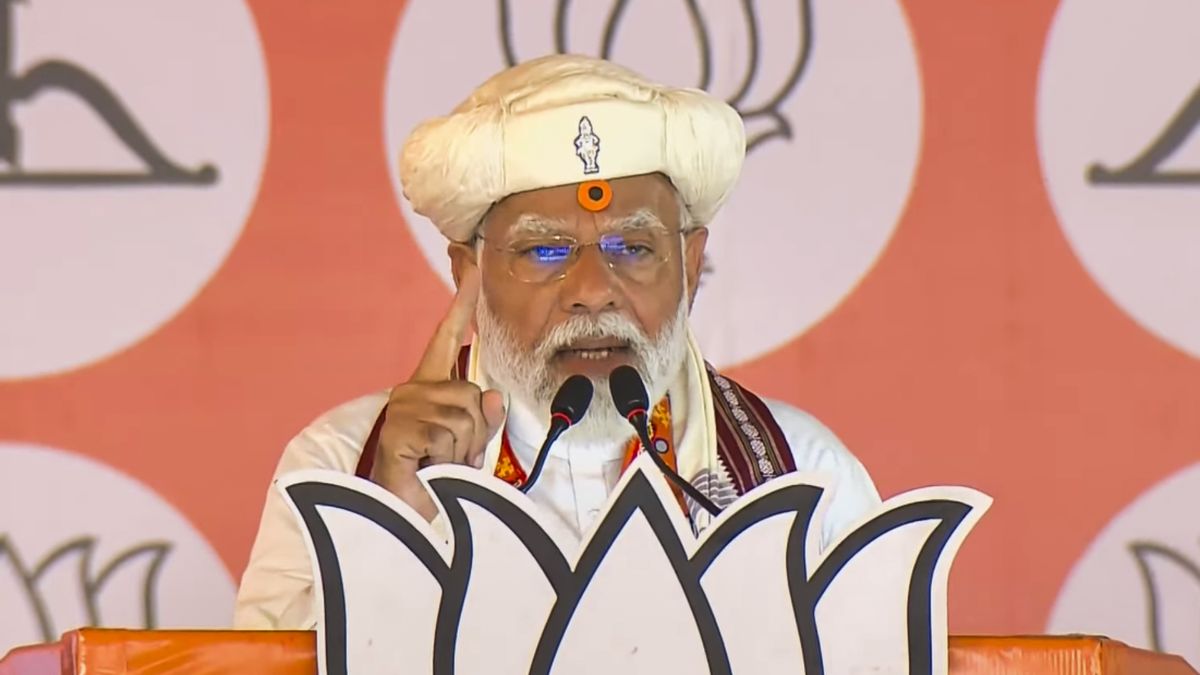







1 thought on “Tokyo Olympics: From a dream in 2020 to a risk in 2021 | Tokyo Olympics News – Times of India”